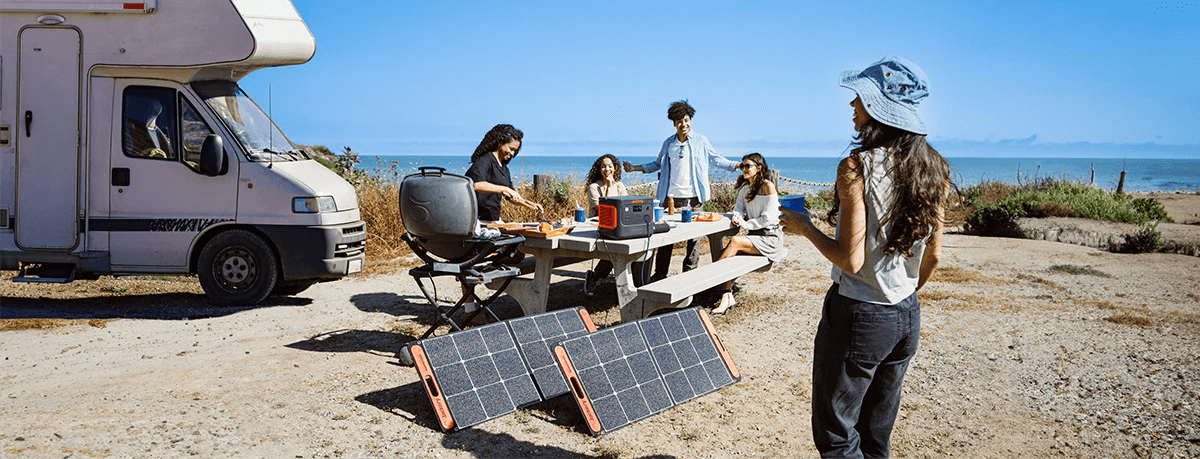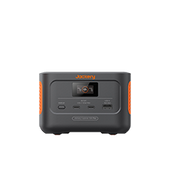Choosing the Best Leisure Batteries for Solar Charging Your Campervan
Van life is simple, cost-effective, and gives you the chance to explore all of the UK and beyond. Riding around in a campervan gives you freedom for a staycation at your local lake, a trip to the city for sporting events, or a lifesaving break from the family on an extended family vacation. At the very least, you get a unique perspective on how to experience the great outdoors while still enjoying the many comforts of a well-equipped home.
All that freedom does come at a cost. Without the best batteries for solar charging, you risk losing out on everything from charging any mobile devices to cooking the steak you’ve been marinating for days just for this occasion.
That is where having a portable power station comes into play. This is a practical solution for cooking, heating, charging, and keeping the LED lights on in the back of the campervan during a long storm. Having a fun, eco-friendly way to boost your electric needs during your next trip is a fantastic idea and part of why so many are flocking to the campervan market.

Power Requirements of Campervans in the UK
Let’s get one thing out of the way early. An average campervan with a complete electrical setup running at optimal rates is likely to draw anywhere from 12 to 20 amps per hour. That is with a significant load from a TV, mini-fridge, laptop, and mobile phone charging at the same time. If you are a bit more conservative with your devices, you can quickly get away with 6-10 amps per hour.
Think of a campervan more like a mobile home. With proper solar generators installed, you get all the freedom of a home on wheels without sacrificing a fully functional trip for your comfort needs. As you outfit your campervan, there are several devices you’ll need to consider.
Start with the basic necessities like lighting. You can install classy, Instagram-worthy bulbs that look straight out of Thomas Edison’s lab or go with a more efficient LED lighting system that won’t draw as much power from your batteries for solar charging. As a bonus, LEDs tend to last longer than traditional bulbs as well, making them a more durable solution for on-the-road enjoyment.
Beyond lighting, most campervans will have several diverse appliances. This might be a small refrigerator or freezer for keeping foods fresh or storing freshly dressed hunting awards. You’ll likely want a way to cook your meals, so be sure to plan on an electric stove or mini microwave. An often-overlooked device is the plugin in min-crockpot, which is perfect for stews, chilis, and soups.
You’ll want a variety of charging stations around the campervan, plus a way to stay warm or cool. This could be a mid-sized car AC system or an electric heater. If you can make a wood stove work inside your campervan, that is probably the most efficient method of staying warm, but be sure to be as safe as possible.
Finally, entertainment and communication. A well-equipped campervan can use a portable solar panel for charging various electrics or enhancing your journey with cameras, projectors, GPS devices, and stereo systems for campfire singalongs.
The Importance of On-the-Road Considerations
Whatever batteries for solar charging you choose, always seek out reliability and consistency. While solar power is a fantastic, eco-friendly option, a surge or interrupted charge can quickly ruin your day if you’re trying to get some work done remotely via a plugged-in network receiver.
Always opt for a solution that takes into account the varying levels of a UK environment. There are always unique weather events happening all over the country, so the choice of a solar panel for car battery charging will matter when trying to avoid a blackout or getting stuck in a shaded area.
In essence, the battery generator you choose must be balanced against your power needs, the environment your campervan will travel around the most, and the types of batteries for solar charging you think will deliver a consistent and reliable charge.
Types of Solar Charging Batteries for Campervans
As you shop around for the best leisure battery for solar charging, you’re bound to come across a range of different materials and technologies. Which one you choose makes a big difference in how well your system operates. The battery not only stores the energy captured from solar sources but also dictates the efficiency and longevity of the entire system. Here are some of the more well-known advantages and disadvantages of the most common batteries for solar charging you’ll come across.
#1 – Flooded Lead-Acid Batteries:
These batteries are made using lead plates, some form of sulfuric acid electrolyte, and a plate separator. Most products are not sealed, and the gases are vented externally to reduce the chance of danger.
Advantages:
- Cost-Effective:As a much older technology, these batteries offer the lowest price point to the market. If you’re operating on a budget, you may want to consider them for your first trip.
- Proven Reliability:Again, being the oldest form, all the bugs and issues have long been worked out. You get exactly what you pay for based on a history of viability.
- Recyclable:These batteries are highly recyclable as long as you visit the right supplier or waste management facility.
Disadvantages:
- High Maintenance: You’ll need to “top off” the distilled water inside the unsealed container to maintain a charge over time. Then there is the concern over spills – which do happen if not kept upright.
- Shorter Lifespan:Compared to other types, flooded lead-acid batters have a much shorter lifespan than others on this list, especially if not maintained properly.
- Lower Efficiency:With the need to top off liquids, these do have lower charge efficiency and higher self-discharge rates.
#2 – Gel Lead-Acid Batteries:
The next step up in batteries for solar charging uses gel made from silica (or sand). That material turns the acid inside into a thick liquid that makes it hard to spill, but the gel is slightly fragile and can burn off under high usage.
Advantages:
- Maintenance-Free: Everything is sealed, so you don’t have to top off the materials, but you should keep them upright, nonetheless.
- Spill-Proof and Safe:Ideal for rugged travelling as they are leak-proof and less prone to damage, so they are an excellent choice for your campervan journeys.
Disadvantages:
- Lower Charge Rates:Gel batteries charge at a slower rate compared to other types of batteries you will use in a solar battery generator situation.
- Temperature Sensitive:They can be less efficient in extreme temperatures like a cold UK winter or the blistering heat along the shore in summer.
#3 – AGM (Absorbent Glass Mat) Lead-Acid Batteries:
An AGM battery is still based on lead-acid technology. The way it creates power is by having a fibreglass mat between the negative and positive lead plates in your batter. That is what abords and holds the battery acid.
Advantages:
- Better Charge Retention:Compared to other batteries on this list, they have a lower self-discharge rate, making them more efficient.
- Vibration Resistance:Well-suited for mobile applications like campervans, camping, mobile homes, and off-grid cabins.
Disadvantages:
- Cost:The price tag is going to be a bit more expensive than flooded lead-acid batteries because of the technology and efficiency.
- Sensitive to Overcharging:You need a way to manage how often and how much of a charge these batteries get, or they can burn out.
#4 – Lithium Iron Phosphate (LiFePO4) Batteries:
These batteries are a giant leap forward in technology by using lithium-ion phosphate, but in a longer lifespan form factor that is less prone to combustion or thermal runaway.
Advantages:
- High Efficiency and Longevity:They offer a longer lifespan and better energy density than any other batteries on this list – perfect for campervan situations.
- Lightweight and Compact:Your campervan will have a weight limit, especially if you are using a lot of appliances or have multiple guests. Saving a little space is always a great idea.
- Fast Charging:This can be charged more quickly than lead-acid batteries, so you get a complete resource while driving before you park.
Disadvantages:
- Higher Initial Cost:Yes, you will pay more upfront. However, you can expect to save on maintenance and replacement over the entire lifespan of the batteries.
- Temperature Sensitivity:Performance can be affected in extreme temperatures. Not necessarily a cold night, but extremely high or low situations.
Calculating Power Usage in Campervans
Choosing which solar panels for charging leisure batteries has just as much to do with amp usage as size or maintenance concerns. To be sure, there is no 100% “average” consumption set point you can expect. With a little bit of math, there is a way to anticipate how different appliances will pull energy from your battery array. Some examples include:
- Lighting: Assuming LED lights are used, each may consume about 10W. For 5 hours of use per day, the daily consumption would be 50 Wh.
- Refrigerator: A small campervan fridge might use around 50W. Running continuously, it would use 1.2kWh per day.
- Phone:Approximately 5W for charging, 2 hours per day or 10Wh per day.
- Laptop:Around 60W for charging, 2 hours per day, or 120Wh per day.
- Camera:Similar to a phone, around 10Wh per day.
- Microwave:800W, used for 15 minutes a day, or 200Wh per day.
- Electric Kettle:1,000W, used for 10 minutes a day, or 170Wh per day.
- Entertainment (TV): A small TV might use about 30W for 3 hours per day, or 90Wh per day.
Again, your estimation will vary depending on your usage. This basic setup would be close to 2kWh per day. So, having a system to store, produce, and generate the proper wattage will ensure you get the full comfort you want while on the road.
Jackery Solar Generators for Campervans
Okay, now that you’ve had a good look at the numbers, it’s time for the solutions. While there are many brands of batteries for solar charging out there, a good starting point is the various power stations and charging tools from Jackery.
Two items in particular that are perfect for campervan enthusiasts include the Jackery Solar Generator 2000 Plus. These should meet all your energy needs for the various devices inside the campervan while keeping your entire system eco-friendly and sustainable.
Jackery Solar Generator 2000 Plus - Features:
- Higher Energy Capacity: Offers a substantial 8Wh capacity and 3000W output.
- Fast Charging Capabilities: Can be fully charged in approximately 7 hoursvia wall outlet and 2 hours with 6 Jackery SolarSaga 200W Solar Panels.
- Expandable Power: Ability to expand capacity up to 12kWh with additional battery packs.
- Versatile Charging Options: Supports solar, wall, and car charging.
- Advanced Safety Features: Built-in protection through an upgraded BMS and a long-lasting LFP battery.
- Smart App Control: Allows for easy monitoring and management of power usage via a mobile app.
Jackery Solar Generator 2000 Plus is optimal for longer campervan trips with multiple people. This is a good selection for digital nomads, those working remotely while enjoying a summer off, or even the many longboat operators around the UK’s canal system. That is because of its higher capacity and charging capabilities.

Conclusion
With this guide, you should have no problem selecting the suitable batteries for solar charging system perfect for your campervan excursion. If you do a little planning upfront, you should have no issue exploring and enjoying all the majestic stops in and around the UK.
Be sure to explore all the options Jackery offers for such power needs. You’ll be on the road and on an eco-friendly journey in no time from these versatile and easy-to-use solar power solutions.
Related Articles:
Unveiling the Advantages and Disadvantages of Solar Energy: A Comprehensive Guide
Ensuring Uninterrupted Power: The Importance of Battery Backup in the UK
Maintaining Efficiency: The Importance of Solar Generator Maintenance






















































































